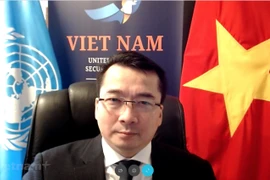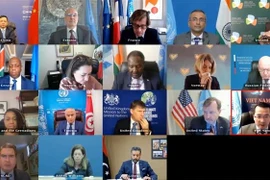Quy was addressing an UN Security Council (UNSC)’svideoconference Arria-formula meeting on February 24 themed “Upholding thecollective security system of the UN Charter: the use of force in internationallaw, non-state actors and legitimate self-defense” with the participants of nearly 30member countries of the UN Security Council and the UN.
He stressed that all countries are obliged to build friendshiprelations and form a culture of upholding the UN Charter and international lawas well as abiding by principles in sovereignty and territorial integrity, not interferinginto internal affairs of other states, not using or threatening to use force,and dealing with disputes peacefully.
The diplomat said that the UNSC should work to enhance the observance of international law and promote the role of internationallaw and UN Charter as a vital tool in maintaining international peace andsecurity, while increasing its coordination with regional organisations andinternational legal agencies in coping with disputes, maintaining peaceand preventing conflicts.
He underlined the need to avoid the abuse and re-explanationof the UN Charter, suggesting the UNSC continue to creating favourableconditions for countries to get access to affairs and documents of the council topromote open and transparent discussions in the field.
Noting that this topic has been mostly discussedamong scholars, Naz Modirzadeh, Director of the Harvard Law School Programme onInternational Law and Armed Conflict, said that all countries are authorisedand responsible in building international law, including the responsibility inprotecting the principle of not using force.
She proposed that all countries should actively engage inopen discussions on the theory of the rights to self-defence and improve thecapacity to get access to announcements and discussions at the UNSC in the field.
Participants at the event underlined the principle of notusing or threatening to use force, which is a foundation for the collectivesecurity system in line with the UN Charter and the UNSC's function inmaintaining international peace and security.
They affirmed that the only exception is the case that isallowed by the UNSC or to implement the right to self-defence. They called for the upholding of the UN Charter in maintaining international peace andstability, while exchanging ideas on the explanation and application of Article51 of the UN Charter on the legal basis for the use of force as a means ofself-defence, as well as on the situation in specific countries and regions./.




























